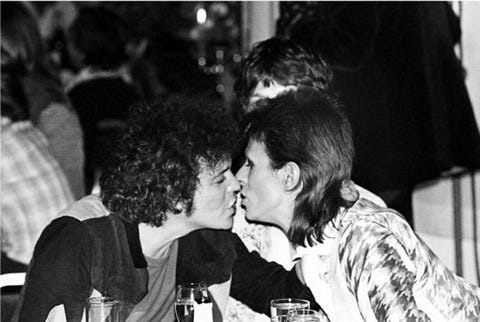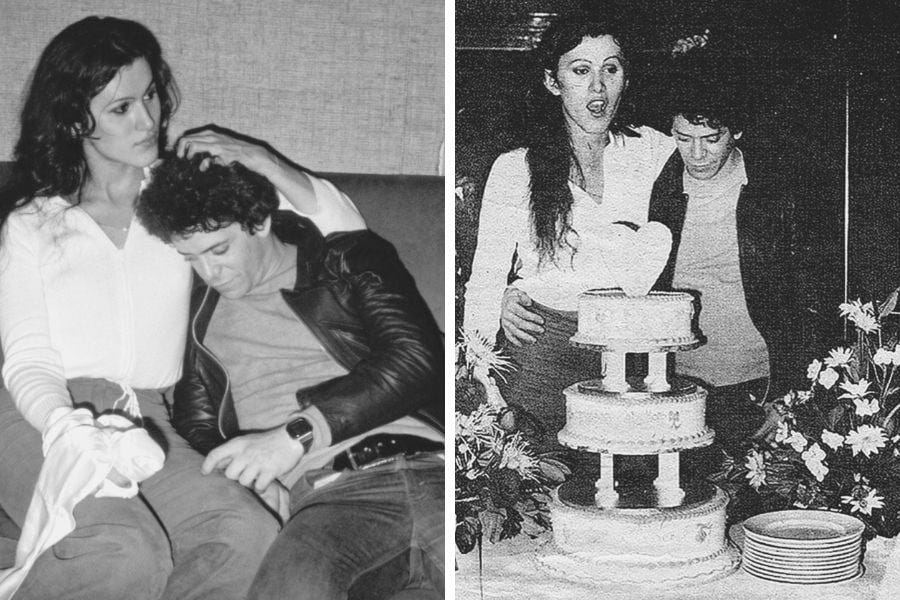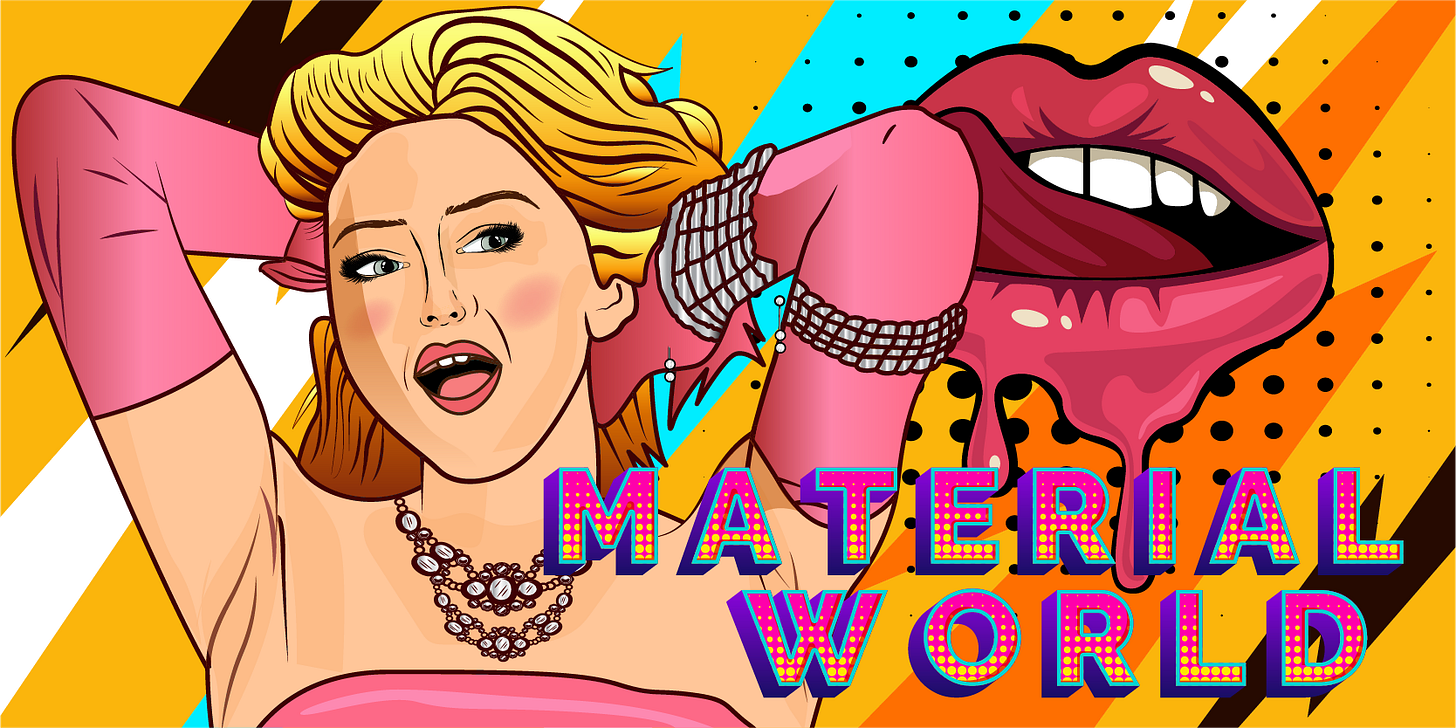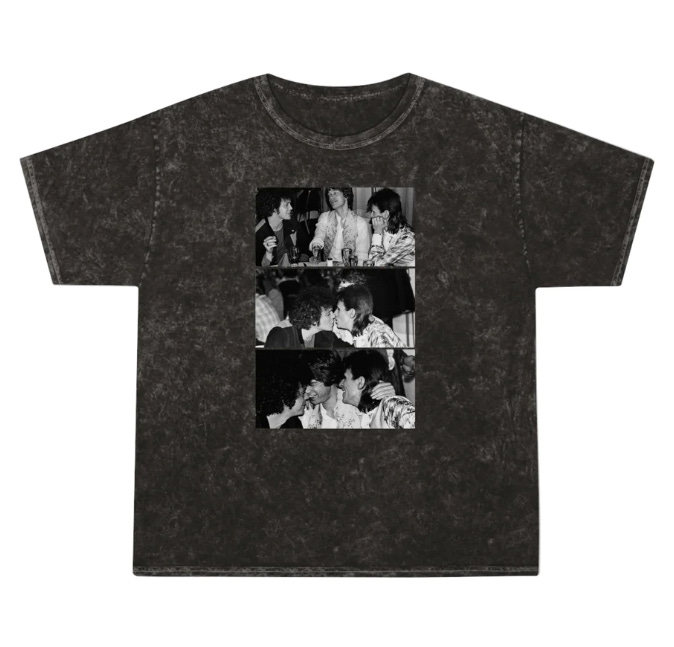"Walk on the Wild Side"- Lou Reed
On Rooting for the Anti-Hero
Reed’s brutal candor celebrates queer lives, but complicates his own.
“They put the thing down your throat so you don't swallow your tongue, and they put electrodes on your head. That's what was recommended in Rockland County to discourage homosexual feelings.”
- Lou Reed, Please Kill Me
Society loves an anti-hero. We root for the Deadpools, the Tony Sopranos, the Holden Caulfields because we see ourselves in their flaws. Unlike Wonder Woman or Superman, we humans cope with trauma by doing bad shit sometimes — drugs, gambling, braking suddenly when that prick is tailgating us too closely. There’s usually a painful origin story that contributes to the anti-hero’s angst.
If that story involves being pinned to a table and electrocuted with 120 volts to remove the “homosexual tendencies” from your brain, you might find yourself conflicted on the merits of moral high ground.
Lou Reed was the LGBT+ community’s first anti-hero. He wrote songs about queer pain long before anyone else and, along with Andy Warhol, created icons out of trans artists like Candy Darling, Holly Woodlawn, and Jackie Curtis. He gave voice to the oppressed but was also, at times, the oppressor — oscillating wildly between embracing and shunning his own “homosexual tendencies.”
His 1974 song, “Kill Your Sons,” addresses the electroshock therapy that Reed endured as a 17-year-old. After a childhood suffering through bouts of panic attacks and depression, Reed became increasingly anti-social as a teenager. Electroshock therapy was recommended by psychiatrists who said it would rid him of his “homosexual tendencies.” His father, who Reed told filmmaker Julian Schnabel was deeply and painfully homophobic, repeatedly sent Reed for treatment at Creedmoor State Psychiatric Hospital in Queens.
All your two-bit psychiatrists are giving you electro shock
They say, they let you live at home, with mom and dad
Instead of mental hospital
But every time you tried to read a book
You couldn’t get to page 17
‘Cause you forgot where you were
So you couldn’t even read
Don’t you know, they’re gonna kill your sons?
Known for his cold stare and unflinching honesty, Reed grew up to embody the gritty downtown Manhattan culture of the 1960s and ‘70s, and his songs documented a life surrounded by artists, societal misfits, sex workers, drug dealers, and junkies. In 1964, he formed the Velvet Underground, a band named after the 1963 novel about BDSM culture and “sexual deviants.” The band played a two-week gig at Café Bizarre in 1965, and their songs about prostitution and drugs would routinely scare away patrons. They did, however, catch the attention of famed pop artist, Andy Warhol, who took a liking to their dystopian lyrics and dissonant guitar sounds. Warhol offered to be their manager and installed them as the house band at his art studio, The Factory. It was here that Reed was introduced to the cast of characters that would inspire so many of his songs. In addition to writing some of rock's most explicit lyrics about drugs ("Heroin," ''Waiting for My Man"), sadomasochism ("Venus in Furs") and prostitution ("There She Goes Again"), Reed also documented the lives of his community of Factory superstars. The song, “Candy Says” was written about trans actress and Warhol muse, Candy Darling and her struggles with gender dysphoria.
Candy says, I’ve come to hate my body
And all that it requires in this world
After five albums released with the Velvet Underground, Reed left the band for a solo career in 1970. His first self-titled solo album was received poorly by critics. But in 1972, Reed collaborated with Velvet Underground fanboy and bisexual poster child, David Bowie, to produce his second solo album, Transformer. Bowie had been deeply influenced by the Velvets music and often covered “White Light/White Heat” and “Waiting for the Man” in his live shows. His own star had just meteorically exploded that year as he was just about to unleash his own masterpiece, The Rise and Fall of Ziggy Stardust and the Spiders from Mars. In the infamous interview with Melody Maker where Bowie came out (“I’m gay, always have been”), he also mentioned that he was producing Reed’s new solo album. In another interview, Reed interrupted the chat to kiss Bowie on the mouth. The anticipation for Transformer’s release was frenzied.
Trans singer and author of 33 ⅓’s book, Transformer, Ezra Furman had this to say about the album: “Transformer did something that neither of them could have done on their own. Lou Reed is so no-nonsense. And with Bowie, gay people are space aliens, it’s all showmanship and everyone wearing costumes. It ‘othered’ queerness, while Lou’s work brought it into reality – made it tangible. The success of ‘Walk on the Wild Side’ helped bring queer lives to the forefront of the public consciousness.”
“Walk on the Wild Side,” the first single from Transformer, would be Reed’s only top 20 single. According to Reed, the song was inspired by Nelson Algren’s 1956 novel, A Walk ontheWild Side. Algren’s novel was about hustlers and prostitutes in the French Quarter of New Orleans in the 1930s. Reed’s song was similarly written drawing from his own community in New York. Each verse refers to one of Warhol’s superstars from his days at The Factory.
Holly Woodlawn:
Holly came from Miami F-L-A
Hitchhiked her way across the USA
Plucked her eyebrows on the way
Shaved her legs, then he was a she
Hey babe, take a walk on the wild side
Holly Woodlawn was a 15-year-old runaway turned trans actress who appeared in Warhol films including Trash and Women in Revolt. Later in life, she also appeared on the television show, Transparent, starring Jeffrey Tambor and Judith Light.
Candy Darling:
Candy came from out on the island
In the backroom, she was everybody’s darling
But she never lost her head
Even when she was giving head
Hey babe, take a walk on the wild side
This would be the second time Reed wrote about Candy, a trans actress who appeared in the Warhol films, Flesh and Women in Revolt. Darling died two years after the song’s release at the age of 29, but her imagery would live on in pop culture as album covers for Anohni and the Johnsons, and the Smiths. In May 1978, when Reed recorded Live: Take No Prisoners, he spoke of her loss. “I really miss Candy, and I didn’t even know her that well.” He kept “Candy Says” in his repertoire throughout his career, and performed it in his final concert in 2013. A biography of her life is set to be published in 2024 called Candy Darling: Dreamer, Icon, Superstar.
Joe Dallasandro:
Little Joe never once gave it away
Everybody had to pay and pay
A hustle here and a hustle there
New York City is the place where
They say, “Hey babe, take a walk on the wild side.”
Dallesandro is a bisexual actor whose first role was as a hustler in Warhol’s Flesh. His nude scenes turned him into a sex symbol in gay culture. A Warhol photograph of his crotch was used for the cover of the Rolling Stones album, Sticky Fingers. The Smiths also used a still of Dallesandro’s body as the cover for their debut album. Dallesandro has appeared in several films including the John Waters classic Cry Baby and Steven Soderbergh’s The Limey.
Joe Campbell:
Sugar Plum Fairy came and hit the streets
Looking for soul food and a place to eat
Sugar Plum Fairy was actor Joe Campbell’s drug dealing character in the Warhol film, My Hustler. Campbell was best known for having famous boyfriends, including queer politician Harvey Milk and Billy Sipple, who thwarted Sara Jane Moore’s attempt to assassinate president Gerald Ford.
Jackie Curtis:
Jackie is just speeding away
Thought she was Janes Dean for a day
But I guess she had to crash
Valium would’ve helped that bash
A stage actress and playwright, Curtis first appeared in the play Miss Nefertiti Regrets in 1965 alongside fellow newcomer, Bette Midler. As a playwright, her productions often featured transgender actors including Candy Darling and Holly Woodlawn. She also gave young Robert De Niro his first stage role in the play Glamour, Glory, and Gold, in which he played six different characters. Curtis died of a drug overdose in 1985. Reed’s lyrics allude to her addiction (and her obsession with actor James Dean).
In 2013, The New York Times described "Walk on the Wild Side" as a "ballad of misfits and oddballs" that "became an unlikely cultural anthem, a siren song luring generations of people...to a New York so long forgotten as to seem imaginary."
Around the same time “Kill Your Sons” was written about persisting through conversion therapy, Reed had also fallen in love with a trans woman named Rachel Humphreys and she became the inspiration for much of the music heard on 1975’s Coney Island Baby and 1978’s Street Hassle. A photo of the two of them (taken by rock photographer, Mick Rock) appeared on the cover of Reed’s 1977 compilation album, Walk on the Wild Side: The Best of Lou Reed.
The pair were together for almost four years. It was rumored that a wedding ceremony took place between them (although unconfirmed, as marriage wouldn’t have been recognized legally). Humphreys served as Reed’s artistic muse and the couple were, by many accounts, inseparable. However, not much has been documented about Humphrey’s life before or after her relationship with Reed.
The relationship deteriorated by 1977. Reed’s drug and alcohol addiction was spiraling out of control. According to Dirty Blvd, the Life and Music of Lou Reed, the relationship also became troubled when Reed refused to help Humphreys pay for gender-affirming surgery. “In the ‘70s, feminists and gay rights activists frequently excluded transgender politics from the polarizing discussion of hetero and homosexual identity. Transphobic activists in the Gay Liberation Front refused to acknowledge a distinction between homosexuality and transgender, considering any surgery a conformist concession to society’s heteronormative prejudices. With regard to surgery, Lou, whose traumatic experience with electroshock therapy was never far from his mind, vacillated on whether Rachel should cave to what he wrongly perceived as a response to social pressure. That would throw Rachel into a tailspin to the point where she had become suicidal.”
By the end of 1977, the relationship was over, and Reed never spoke publicly about her again. The break-up did inspire the title track to Street Hassle, released in 1978.
Love has gone away,
took the rings off my fingers
And there’s nothing left to say
Though Reed was never one to publicly label his sexuality, he began to shun references to his queerness after the dissolution of his relationship with Humphreys. According to the unauthorized biography, Lou Reed Talking, he is quoted, “All the albums I put out after this are going to be things I want to put out. No more bullshit, no more dyed hair, faggot junkie trip.” That same year, Reed released a live album, Take No Prisoners, and can be heard between songs asking for a cigarette. “I have no attitude without a cigarette. I’d rather have cancer than be a faggot. That wasn’t an anti-gay remark. Coming from me it was a compliment.”
Having already been divorced from his first wife, Bettye Kronstad prior to his relationship with Humphreys, Reed would go on to marry designer Sylvia Morales in 1980 and then acclaimed avante-garde artist Laurie Anderson in 2008, with whom he remained until his passing in 2013.
Though Reed is considered a queer icon and someone who helped normalize LGBTQ lives through his music, he was also a complicated hero.
“The line is blurry between when he’s normalizing queerness and sort of erasing it in himself,” Furman suggests. “I’m also connected to that self-erasure because I’ve spent a lot of time doing that in my life. I don’t admire it, and I don’t endorse it in myself, I just know what it’s like to want queerness to just go away, and to not get caught out of the closet.”
Although unconfirmed, it is rumored that Rachel Humphreys died of complications from AIDS in 1990. Although Reed never spoke of her after 1978, his 1989 song about the AIDS crisis, “Halloween Parade,” may have alluded to his fear of her passing.
In the back of my mind I was afraid it might be true
In the back of my mind I was afraid that they meant you
The song is a celebration of his former community and the famed queer Halloween event in Greenwich Village. But it’s also a eulogy to the lives lost.
But there ain't no Harry and no Virgin Mary
You won't hear those voices again
And Johnny Rio and Rotten Rita
You'll never see those faces again
So many of Reed’s friends were now gone. Former loves, also gone. Reed may have been a complicated anti-hero, but the queer community that he helped shape in the 60s and 70s will always live on through his music.
Like this post? If you felt inspired or learned something, consider supporting my work by upgrading to a paid subscription.
Or, if you’d prefer a smaller donation (of any amount) you can do so below:
It’s so easy when know the rules. It’s so easy, all you have to do is…
Name the band that Lou Reed performed “White Light/White Heat” with at the 2006 MTV Video Music Awards?
A. The Strokes
B. My Chemical Romance
C. The Raconteurs
D. Gnarls Barkley
And you’re a material girl.
Welcome to our merch store! Every week, we’ll offer some cool swag based on the artist from each issue.
Quiz Answer: It’s C - The Raconteurs
Did you catch last week’s issue?

















I love this post. Also I love this song, it’s in my all time top ten.
I have to say I did not fully agree with where you couched Bowie in the pantheon of gay icons in your post about Ziggy, I felt there were gaping holes and misinterpretations that misrepresented who Bowie actually was. However Ezra Furman’s quote in this post about Lou Reed, about Bowie’s adoption as a gay icon being mostly about showmanship and notoriety to Bowie, sums up so succinctly what it would probably take me pages of rambling to try to say.
The other things that I’d say about this song, about Wild Side, is wow! Bowie’s production, it’s perfect!!! The musicians, are unbelievably good!!! The baseline!!! The quality of the recording, stunning!!! And that’s without mentioning the simple brilliance of the chord structure and way Reed captures these five vignettes so completely in four short lines a piece... he takes you there with him. Poetic genius.
Stellar work, Jami! If you haven't yet, you need to start thinking about compiling your work into a book that focuses on....well, all the subjects you write about here!
I was on "Walk on the Wild Side" upon release, only because I knew all the references.....thanks to my constant cover-to-cover pouring through Hit Parader, CREEM, PRM....well, all of 'em, really! And, thanks to Bowie's early songs, and a subscription to Andy Warhol's Interview Magazine, I came to know about all of them! Even (dare I say, especially) Joe.
BTW, I searched your "Songs That Saved" site, and noticed you've written nothing about Wayne/Jayne County (unless I missed it). May I kindly make a request, please?😁Also (and I know Substack's bandwidth is limited), but as much Joe as can fit on a page, pleeeeeze?😱